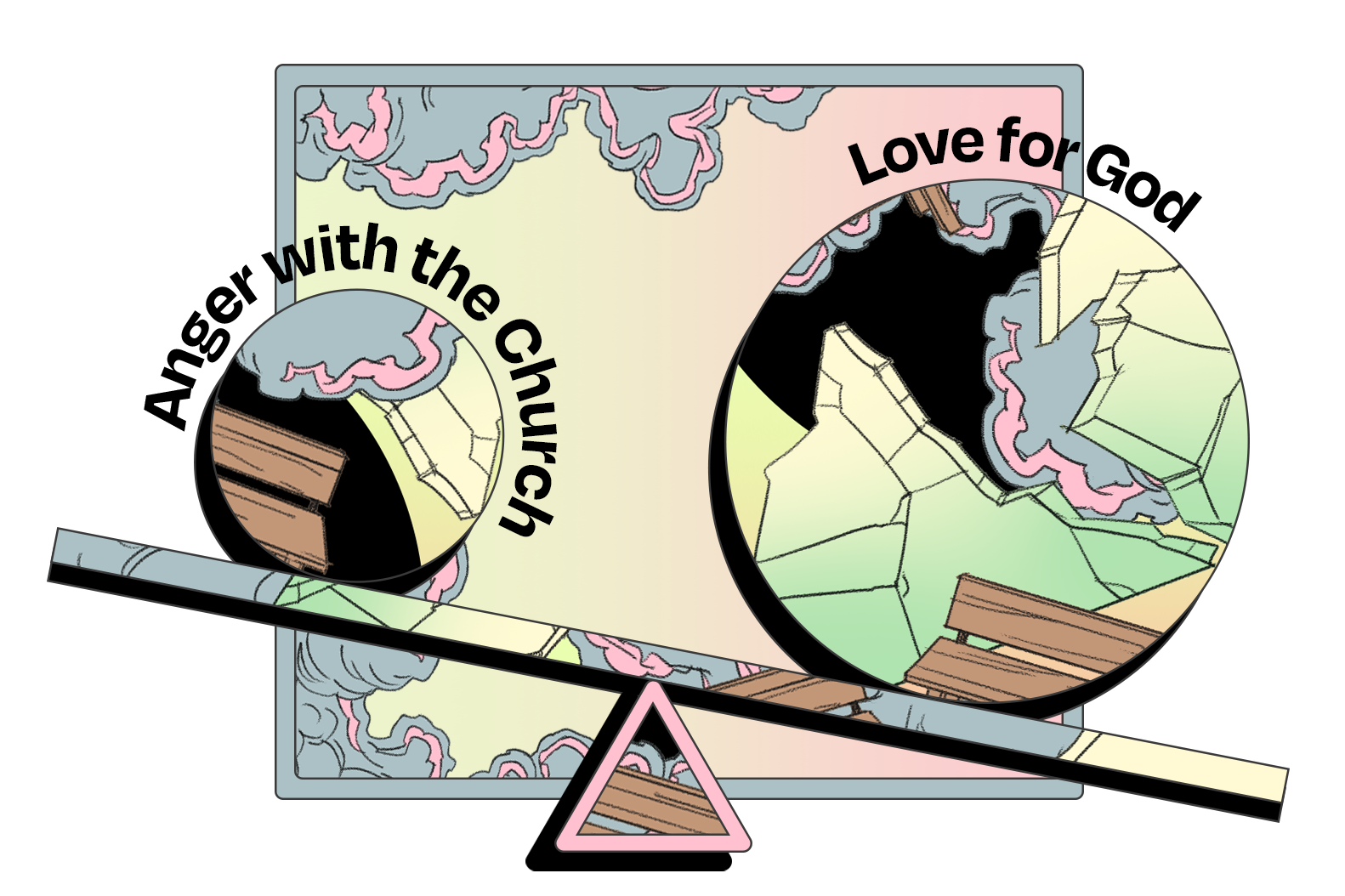I have only ever called one church “home”.
I went to Sunday School at this church, grew into their youth group, graduated to their adult services, volunteered, became a leader, and eventually joined their pastoral team as a staff member.
The first time I experienced church division, I was part of their youth group.
“Where did my friends go? Why are my leaders suddenly no longer my leaders? Why has my youth pastor left?”
Our youth group comprised of two different congregations. The two congregations had a disagreement and decided to split ways.
As a youth, the experience was confusing and difficult to understand. “Where did my friends go? Why are my leaders suddenly no longer my leaders? Why has my youth pastor left?”
No one could give us any real answers. We were too young to understand.

The next time I experienced a real church division, I was a young adult.
Different factions of our church had a disagreement over church assets, and I watched from the back of the room as adults accused each other of terrible things.
I comforted a much older pastor outside as she wept over the horror we were all witnessing. I felt the ugliness of that meeting in the pit of my stomach and repented over and over again on behalf of our church. “God, forgive us, for we know not what we do.”
Since then, there have been more instances of division. Whether it be the moral failure of pastors, disagreements within the community or leaders leaving the church because they have been hurt by the decision of others, the result has always been devastating.
If we’re called to be one, why are we so divided?
Division in church isn’t something new. When I share my own negative experience about church with others, I realise that my story is not a unique one.
Time and time again, people have responded with understanding because they had experienced something similar, with varying degrees of severity.
Though the details of our stories may be different, all of us have come out of these situations with our view of church slightly altered.
It begs the question: If the church is one, why is there so much division?

Well, the church is human, even as it’s linked to the divine.
The head — Jesus — is a holy and an infallible being, but the body — made of the believers — is sinful, broken, and weak.
So perhaps the question is less about the why, but how we can love the church that’s both one (under Christ) and divided (made up of divisive human) at the same time.
When I left the church that I had been a part of for 20 years, I was broken, angry, and disillusioned.
I felt deeply betrayed by the church I had poured so much of myself into–one that made decisions that caused hurt in a community I loved with little remorse. I had lost trust in the church system and was unable to see how I could join another church in the foreseeable future.
But over the course of the last few months, I have begun a tentative relationship with a new church, still cautious but hopeful. What changed?
1. I learnt to place my hope in Christ, not the Church
We often make the mistake of thinking God and the Church are the same, and expect the Church to be everything Christ is — holy, loving, trustworthy, unfailing, a place of safety and refuge.
But for many of us who have experienced hurt in the Church, we also realise that even though the Church is often not who she aspires to be, Christ who is the head of church is never failing.
The shortcomings of the Church are not a reflection of who God is, but a reflection of who mankind is.
Unknowingly, I had elevated the Church to be of equal stature as Christ.
Often, I was more connected with and devoted to the church than I was towards God. The sin was so slight that it was difficult to see at the time. It took time to untangle the internal mess that was my relationship with God and the Church.
But with God guiding me, they are now each in their rightful positions.
We often make the mistake of thinking God and the Church are the same
Learning to place my hope in Christ and letting that hope overflow to the Church despite all the disappointment I’ve experienced gave me the courage to join another church.
As Romans 5:5 puts it, “. . . hope does not put us to shame, because God’s love has been poured into our hearts through the Holy Spirit, who has been given to us.”
When we put our hope in Christ, we will never be disappointed. He does, and will, fulfil every promise He makes to us and to the Church.
2. My love for God outweighed my anger with the Church
I took about four months off attending churches after leaving my own church. I needed time to thrash out all the emotions I was feeling with God without the pressure of trying to be part of a new community.
One day, after a particularly disappointing staff meeting at my former church, He brought to the surface some very uncomfortable emotions I was having whenever I had thoughts about my church.
In my bitterness and anger, I said to God, “Well, don’t I have the right to be after all they have done?”
Very quickly, He led me to the book of Jonah.
Reading the story reluctantly, I knew God was trying to say something to me. Somewhere between all the disappointment and frustration, the Church had become my Nineveh.
The question God throws at Jonah as he rants about God’s character was the same question He was asking me — “Is it right for you to be angry?” (Jonah 4:4).
And like Jonah, I really did feel that in the depths of my heart, I had every right to be angry. Like Jonah, I was so angry I wished I was dead (Jonah 4:9).
I went to sleep that night without responding to God.

As I woke up the next morning, I felt the Lord whispering these words into my heart: “Soft heart, my child, soft heart.”
Like a flashing warning light, it was a reminder that my heart was on the path to being hard and calloused. Immediately, I repented.
God’s love for His church is the same as His love for us. His mercy towards the Church is the same mercy He extends towards us when we fail, when we sin. There are many reasons to dislike the Church, but there are more reasons to love God.
3. I found a safe space in a new community
After walking away from my local church, I felt “happier” not being tied down to a church, as my heart was less burdened.
Even though I wasn’t attending church weekly, I still felt connected with God — and experienced Him in such a real and beautiful way.
However, it’s difficult to be a disciple of Christ and ignore certain passages in the Bible.
In Hebrews 10:23-25, God tells us to “not give up meeting together”, but to continue “encouraging one another” and spurring each other “towards love and good deeds”.
The thought of finding a new community after a negative experience in a church was daunting — it was like stepping into dating again after a toxic relationship.
Each week I walked into a new church, I would have “walls” erected to protect my very wounded heart. Giving up would have been the easy road.
But this verse reminded me that as wonderful as my time was alone with God, I needed to be part of a community again — a safe space that would help me heal and process what I had gone through.
And God, being the patient and gentle Father that He is, led me to a place where I felt brave enough to step into a church again.
The first time I attended this church, I was invited to their monthly “Welcome to Church” lunch after the service. Initially, I made up some lame excuse and told them I’d think about it. But I finally decided to pluck up my courage and agreed to join the lunch.
During lunch, I sat next to one of the pastors and we had a great conversation that had nothing to do with church or God. It was just a simple conversation about everyday life.
I had been a leader for so long and been on the team that led the church through times of crisis for so many years, I couldn’t remember the last time I had felt so much safety and warmth from a pastor.
It was then that I decided to try out this church and see how it turns out.
The new community has been an integral part of my healing journey. They have encouraged me, prayed for me, and listened to me with empathy and compassion. They also understood the fine balance of giving me the space I needed, while helping me to stay connected.
There are still some walls up within me, but the pastors and leaders have been patient and kind to me.
I was constantly brought back to this verse
“As a prisoner for the Lord, then, I urge you to live a life worthy of the calling you have received. Be completely humble and gentle; be patient, bearing with one another in love. Make every effort to keep the unity of the Spirit through the bond of peace. There is one body and one Spirit, just as you were called to one hope when you were called; one Lord, one faith, one baptism; one God and Father of all, who is over all and through all and in all” (Ephesians 4:1-6).
For over 12 months, as I was considering whether I should stay or leave, God brought me back to Ephesians 4:1-6 many times over, and reminded me through this passage that we (the Church) are united in Christ and therefore, are to “bear with one another in love” (Ephesians 4:2).
This has been a journey of repentance as much as it has been one of healing.
I am confident that God wasn’t speaking to how I had walked away from a toxic environment, but more towards the posture of my heart.
This has been a journey of repentance as much as it has been one of healing.
As God revealed to me the depth of His love for the Church, I found it impossible to turn my back on it.
He will never abandon His bride and will always remain faithful to the Church, welcoming her back into His loving arms any time she stumbles.
This article was first published on YMI and is republished with permission.
- Have you ever encountered disunity in your spiritual community before?
- How can you contribute to unity, peace and oneness in your church?
- This week, text your spiritual leaders to bless them and let them know you are supporting them.










